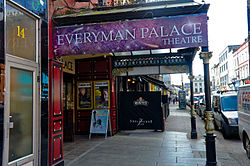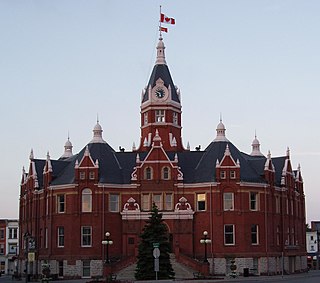
Stratford is a city on the Avon River within Perth County in southwestern Ontario, Canada, with a 2021 population of 33,232 in a land area of 30.02 square kilometres (11.59 sq mi). Stratford is the seat of Perth County, which was settled by English, Irish, Scottish and German immigrants, in almost equal numbers, starting in the 1820s but primarily in the 1830s and 1840s. Most became farmers; even today, the area around Stratford is known for mixed farming, dairying and hog production.

The Palace Theatre is a West End theatre in the City of Westminster in London. Its red-brick facade dominates the west side of Cambridge Circus behind a small plaza near the intersection of Shaftesbury Avenue and Charing Cross Road. The Palace Theatre seats 1,400.
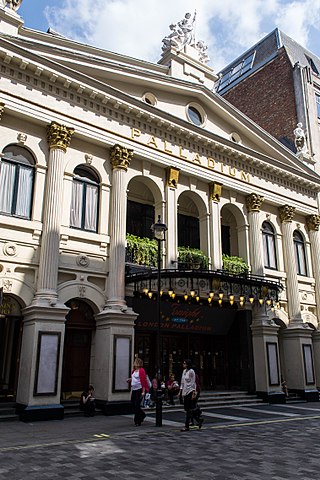
The London Palladium is a Grade II* West End theatre located on Argyll Street, London, in Soho. The theatre was designed by Frank Matcham and opened in 1910. The auditorium holds 2,286 people. Hundreds of stars have played there, many with televised performances. Between 1955 and 1969 Sunday Night at the London Palladium was staged at the venue, produced for the ITV network. The show included a performance by the Beatles on 13 October 1963; one newspaper's headlines in the following days coined the term "Beatlemania" to describe the hysterical interest in the band.

Alexandra Palace is an entertainment and sports venue in North London, situated between Wood Green and Muswell Hill in the London Borough of Haringey. A Grade II listed building, it is built on the site of Tottenham Wood and the later Tottenham Wood Farm. Originally built by John Johnson and Alfred Meeson, it opened in 1873 but following a fire two weeks after its opening, was rebuilt by Johnson. Intended as "The People's Palace" and often referred to as "Ally Pally", its purpose was to serve as a public centre of recreation, education and entertainment; North London's counterpart to the Crystal Palace in South London.

Cork Opera House is a theatre and opera house in Cork in Ireland. The first venue opened in 1855 on Emmet Place to the rear of the Crawford Art Gallery. This original building was destroyed by fire in 1955, and a replacement opened in 1965. With a number of additions in the early 21st century, the 1000-seat venue hosted over 100 theatre, music, opera, and comedy events in 2015.
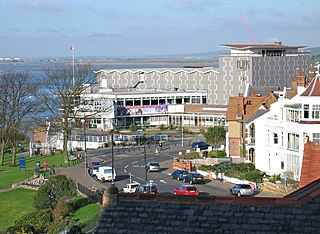
Cliffs Pavilion is a theatre, sports, exhibition and concert venue located on Station Road in Westcliff-on-Sea, Essex, England, a suburb within the city of Southend-on-Sea. It is the largest purpose-built arts venue in Essex, and the largest capacity of any theatre in the East of England. In 2006, the operation of Cliffs Pavilion, along with the Palace Theatre, were handed to HQ Theatres by Southend-on-Sea Borough Council. HQ Theatres merged with Trafalgar Entertainment in 2021. In February 2022, the Cliffs played host to He Built This City concert, a tribute to the murdered MP for Southend West Sir David Amess.

The Criterion Theatre is a West End theatre at Piccadilly Circus in the City of Westminster, and is a Grade II* listed building. It has a seating capacity of 588.

The Palace Theatre is one of the main theatres in Manchester, England. It is situated on Oxford Street, on the north-east corner of the intersection with Whitworth Street. The Palace and its sister theatre the Opera House on Quay Street are operated by the same parent company, Ambassador Theatre Group. The original capacity of 3,675 has been reduced to its current 1,955.

Buxton Opera House is in The Square, Buxton, Derbyshire, England. It is a 902-seat opera house that hosts the annual Buxton Festival and the International Gilbert and Sullivan Festival, among others, as well as pantomime at Christmas, musicals and other entertainments year-round. Hosting live performances until 1927, the theatre then was used mostly as a cinema until 1976. In 1979, it was refurbished and reopened as a venue for live performance.

A music venue is any location used for a concert or musical performance. Music venues range in size and location, from a small coffeehouse for folk music shows, an outdoor bandshell or bandstand or a concert hall to an indoor sports stadium. Typically, different types of venues host different genres of music. Opera houses, bandshells, and concert halls host classical music performances, whereas public houses ("pubs"), nightclubs, and discothèques offer music in contemporary genres, such as rock, dance, country, and pop.

Riverside Studios is an arts centre on the north bank of the River Thames in Hammersmith, London, England. The venue plays host to contemporary performance, film, visual art exhibitions and television production.
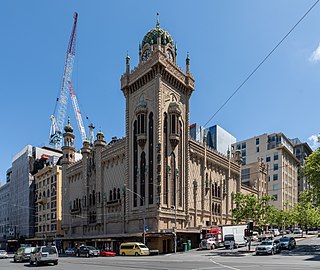
The Forum Theatre is a historic theatre and former cinema now used as a live music and event venue located on the corner of Flinders Street and Russell Street in Melbourne, Australia.
Friday Night Is Music Night is a long-running live BBC radio concert programme featuring the BBC Concert Orchestra, broadcast from 1953 to 2023 on the BBC Light Programme and its successor BBC Radio 2, moving to BBC Radio 3 from April 2024.
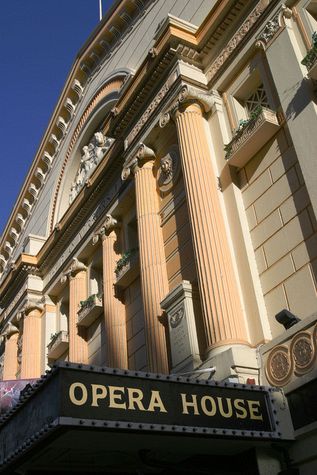
The Opera House in Quay Street, Manchester, England, is a 1,920-seater commercial touring theatre that plays host to touring musicals, ballet, concerts and a Christmas pantomime. It is a Grade II listed building. The Opera House is one of the main theatres in Manchester. The Opera House and its sister theatre the Palace Theatre on Oxford Street are operated by the same parent company, Ambassador Theatre Group.

The Regent Theatre is an historic former picture palace built in 1929, closed in 1970, and restored and reopened in 1996 as a live theatre in Collins Street, in the city of Melbourne, Australia. It is one of six city theatres collectively known as Melbourne's East End Theatre District. Designed by Cedric Heise Ballantyne in an ornately palatial style, with a Gothic style lobby, Louis XVI style auditorium, and the Spanish Baroque style Plaza Ballroom in the basement, it is listed by the National Trust of Australia and is on the Victorian Heritage Register.
Montfort College of Performing Arts is a stage school in Cork City in the Republic of Ireland; it specialises in vocal technique, dance classes, singing classes, drama and musical theatre.

The Hilbert Circle Theatre, originally called the Circle Theatre, is in Indianapolis, Indiana, on Monument Circle in the Washington Street-Monument Circle Historic District. It was originally built in 1916 as a "deluxe movie palace" and now is the home of the Indianapolis Symphony Orchestra.
The Irish Times Irish Theatre Awards recognise outstanding achievements in Irish theatre.

University of Tartu Viljandi Culture Academy is an Estonian institution of higher education, situated in the provincial town of Viljandi, central Estonia. The UT Viljandi Culture Academy merged with the University of Tartu in 2005. The UT VCA has been teaching professional higher education and performing applied research within information science, culture education and creative arts since 1952. The academy has about 1000 students, half of whom are open university students. The teaching and instruction are based on the continuity and sustainability of Estonian native culture enriched by new impulses which widen the notion of traditional culture. As of 2021, the Director of the institution is Juko-Mart Kõlar.
Killian Donnelly is an Irish tenor singer and stage actor. He has appeared in musicals such as Les Misérables, The Phantom of the Opera, and Kinky Boots.
